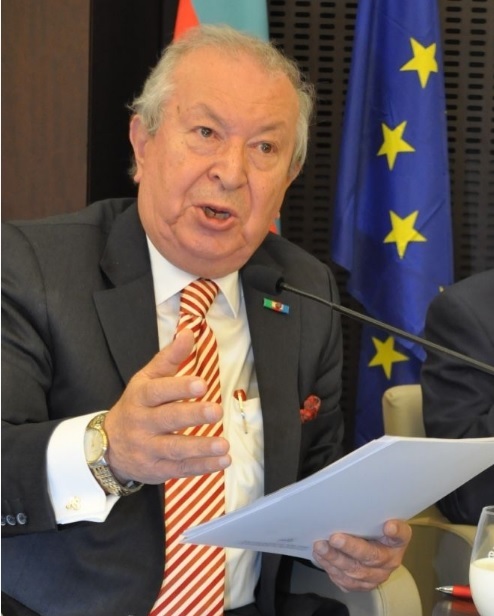International forum on “Threats to international Peace and Security posed by Separatism
An international conference with the topic "Separatism - Discrimination" was organized by the Ministry of Diaspora of Azerbaijan at the Marriot Hotel in Brussels. Dr. Akkan Suver and Şamil Ayrım from the Marmara Group Foundation attended the conference that was opened by the Vice President of Azerbaijan, Prof. Dr.Ali Hasanov. 29 countries participated in the conference attended by famous statesmen such as President of Ukraine Viktor Yushchenko (2005-2010), President of Israel Dalia Itzik (2007), and Prime Minister of Bosnia and Herzegovina Hasan Muratovic (1996-1997).
Ramona Nicole Manescu of the European Parliament, Robert Ilatov of the Israeli Parliament, Maxim Kuryachi of the Parliament of Ukraine, Ioannis Kefalogiannis of the Parliament of Greece and Erşad Reşit Fathallah of the Parliament of the Iraqi were also present at the conference, which was organized on the initiative of the Azerbaijani Diaspora Minister Nazim Ibrahimov. Dr. Akkan Suver directed the third panel of the conference with three large panels.
The panel lead by Dr. Suver was attended by Erşad Reşit Fathallah, Sahil Gasimov, Rovshan Rzayev, Helga Daub, Aurelia Andreyevna Grigoriu, Maxim Shevchenko, Prof.Dr. Guram Rajdenovic Markhulia, Ruslan Shevchenko, Prof. Dr. Oleg Kuznetzov, Prof. Dr. Hans-Joachim Heintze, Prof. Dr. Johannes Rau and Alexander Karavayev, who held their speeches. At the end of the panel, Prof.Dr.Ali Hasanov thanked the attendees of the successful conference in the name of the Azerbaijan State.
.jpg)
Please find Dr. Akkan Suver's speech below:
"Freedom cannot be achieved by usurping the rights of another country's people"
Jeremy Bentham
In times of the Cold War, the world consisted of two poles.
Behaviors were predictable in advance.
With the fall of the Berlin Wall, the world got smaller first, then liberty increased.
Globalization and the rapid development of technological possibilities have brought a new order to the world.
The wind of globalization that blew until
Liberty or safety?
The ethnocentrism that started through with the increasing of extreme nationalism and involuntary migration put forth politicians that rely on populism.
The fact that small countries that cannot cope with big nations leads to their status as economic losers and ergo to an incensement of globalization opponents in these countries.
Those who think that immigrants come to these small countries "will get my work away", and those whose part of the big cake gets smaller, those have been heading to an inward politics.
And this has increased an extreme nationalism and xenophobia. The owners of ethnocentric political views have reached a high prestige not only in The Netherlands, Austria, Hungary and Poland but also in Germany and France.
Fears have changed for humanity.
The world stands at the edge of a crisis.
And everyone is questioning: "Where is our world going to?"
By the way, thoughts like discrimination, like racism that were forgotten for so many years, have rised again.
Years ago, Huntington said that "civilizations will clash". What he thought of was the Christian-Muslim clash. But what actually clashed is the difference between economic freedom and democracy or the question whether to have more freedom or rather safety.
And in this environment I attach big importance to this international summit which is organized by the Ministry of Diaspora of Azerbaijan.
And I also want to share another significant topic with your high committee.
We are also going to discuss Nagorno-Karabakh.
Nagorno-Karabakh is legally part of Azerbaijan. It was forcely distorted. It is not me saying this. It is the United Nations who say this. We are expecting the United Nations to put their weight on this topic.
And as we are talking about discrimination today, please allow me to show that the attitude of Armenia, trying to establish a mono state with one single religion, one language and only one folk is an attitude that serves discrimination
I would like to emphasize once more before opening the session; the Nagorno-Karabakh issue can only be discussed with United Nations resolutions. The European Court of Human Rights affirms that disputed territories, unlike the Armenian discourses, are not liberated but "occupied".
It should be remembered that the international law does not convict the state that uses force to take back territories occupied by another state.


